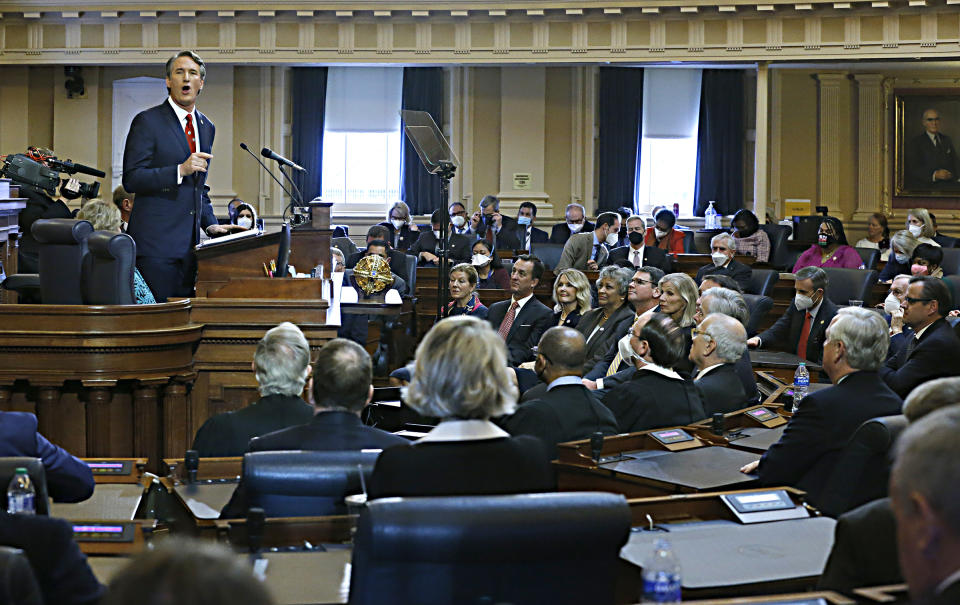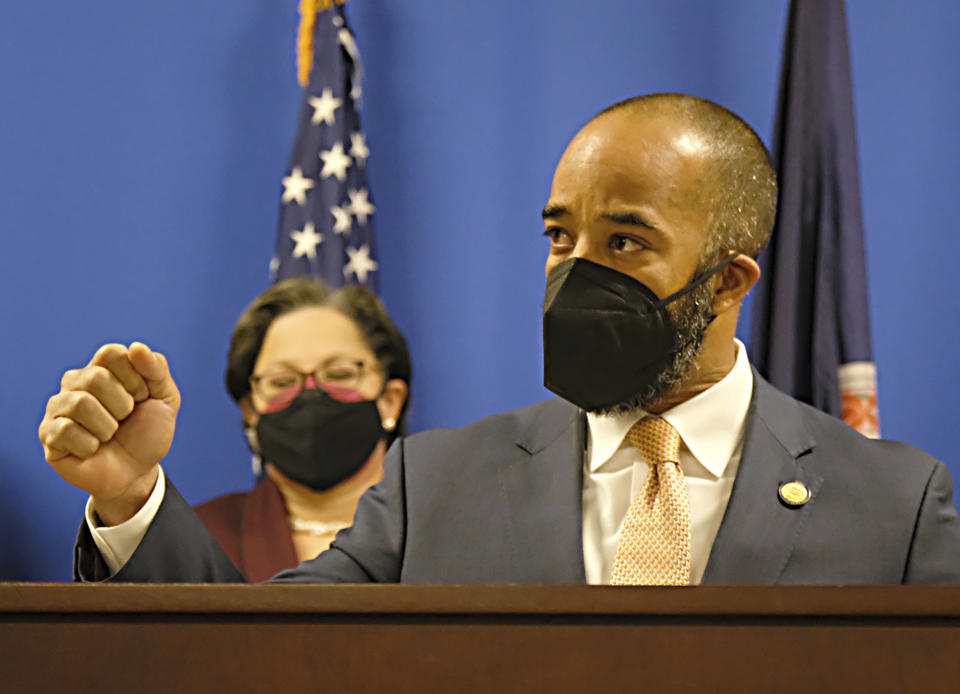Confusion, lawsuit follow Virginia governor's order on masks
RICHMOND, Va. (AP) — Virginia's new Republican governor was facing pushback from Democratic lawmakers, school districts and a group of parents who sued him Tuesday over an executive order that aims to create an opt-out for classroom mask mandates.
The order issued Saturday and set to take effect Monday was among Glenn Youngkin's first acts after he was sworn in as Virginia's 74th governor. The move both fulfilled a campaign pledge and inserted Youngkin, a political newcomer working with a divided legislature, into a divisive issue that’s generated legal challenges in other states.
Youngkin’s order said parents of any child in elementary or secondary schools or a school-based early childcare or educational program “may elect for their children not to be subject to any mask mandate.”
In part because of a state law passed last year dealing with classrooms and pandemic policies, school districts in many of the state’s most populous localities have since told parents they planned to keep existing mask mandates in place, at least temporarily.
The 2021 law says each Virginia school board is required to offer in-person instruction that adheres “to the maximum extent practicable” to COVID-19 mitigation guidelines from the federal Centers for Disease Control and Prevention. The CDC currently recommends universal masking by anyone 2 and older, regardless of vaccination status.
Many districts — from Charlottesville to Richmond to Arlington — cited that law in announcing that they had no plans to immediately change masking rules. Others said they were reviewing the guidance or waiting for further clarity from the state, while at least two, King George County and Louisa County, announced plans to comply.
On Tuesday, a group of parents of children in Chesapeake Public Schools sued the governor and members of his administration in the Supreme Court of Virginia, arguing that the executive order violates state law.
“Petitioners have no adequate remedy at law and no time to spare. They and their children are likely to suffer irreparable harm and damage if this Court declines to grant immediate relief,” they wrote.
Asked for comment on the legal challenge, Youngkin spokesperson Macaulay Porter responded: "We will continue to protect parents’ fundamental right to make decisions with regard to their child’s upbringing, education and care.”
She did not respond specifically to a question about how the governor intended to enforce the order.
Youngkin, who is an advocate of vaccination efforts but campaigned against mask and vaccine mandates, recently said he would “use every resource within the governor’s authority” to ensure parents can choose whether their children wear masks. He also ended a vaccinate-or-test mandate for state workers through an executive order Saturday.
Democrats accused him of overstepping his authority on the mask order, ignoring the state law and attempting to bully local school districts.
“I'm disappointed that, you know, right out of the gate we’re focused on culture wars rather than the goals of educating children,” said Democratic Del. Schuyler VanValkenburg, a public school teacher.
University of Richmond law professor Jack Preis said a parent or school district would have a strong argument that the order violates the state law.
“State law trumps an executive order, no doubt,” said Preis, who has taught courses on legislative and administrative law.
“If he wants to give parents the right to opt out of mask rules, he needs to change the statute, and that starts with the legislature,” Preis said.
But some Republicans have argued that the state law doesn't mandate masks. Among them was state Sen. Siobhan Dunnavant, a physician who helped negotiate the bill, which also mandated in-person instruction. Dunnavant said this week that the law doesn't mandate masks because the CDC does not mandate masks — it only recommends them.
Youngkin's order says masks “inhibit the ability of children to communicate, delay language development, and impede the growth of emotional and social skills.”
The Virginia chapter of the American Academy of Pediatrics weighed in on the issue, continuing to recommend children wear a well-fitting face mask at school, regardless of vaccination status.
Most states let schools decide their own mask policies, but several Republican-led states have moved to forbid mask requirements in public schools. Such bans remain in effect in Florida, Texas and Utah, while some others have been rejected by courts or face ongoing legal battles.
Debate over masks has intensified as schools struggle to contain the omicron variant, which has been blamed for forcing hundreds of schools across the U.S. to return to remote learning and has also led some districts to reinstate mask policies.
Two parents in Bedford County, which voted last week to repeal its mask mandate before Youngkin's executive order, offered differing opinions on the need for masks in schools.
Chelsea Jones, 30, has a 6-year-old son in elementary school. She said she worries that mask-wearing affects speech development because children rely on facial expressions to communicate. Noting that adults don't wear masks in other public settings, she said that “the kids are almost being punished for being kids.”
But Brian Mulligan, 53, was concerned about the risk to his 14-year-old son who has cystic fibrosis. He said he voted for Youngkin, but felt betrayed by the executive order.
“If masking can save just one child, isn’t it worth the masks?" Mulligan said.
____
Associated Press writers Parker Purifoy in Washington; Sarah Brumfield in Silver Spring, Maryland; Denise Lavoie in Richmond, Virginia; and Collin Binkley in Boston contributed to this report.

 Yahoo Movies
Yahoo Movies 


